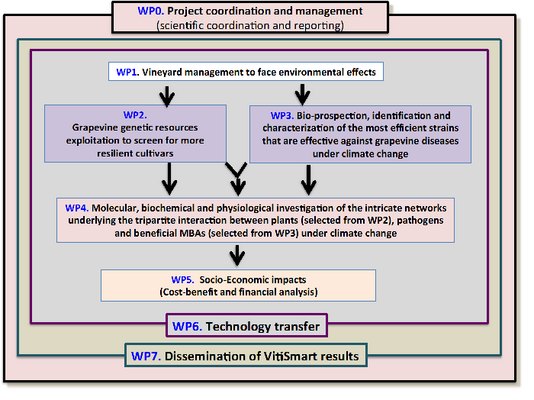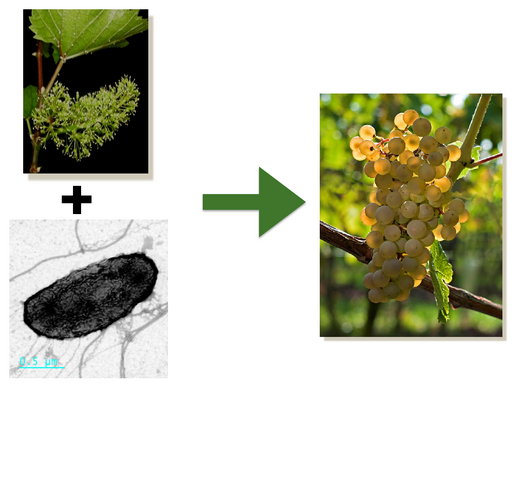VitiSmart
Toward a sustainable viticulture: Improved grapevine productivity and tolerance to abiotic and biotic stresses by combining resistant cultivars and beneficial microorganisms (VitiSmart)
Project abstract
Climate change (CC) will affect the ecosystem processes such as primary production, the distribution and the abundance of plant species. Climate change will also alter the plant diseases since the rate at which pathogens evolve and overcome host resistance may increase. Because abiotic factors such as temperature affect host susceptibility to pathogens and pathogen aggressiveness, interactions between plant resistance traits and abiotic stress tolerance may represent the most substantial impact of climate change on plant productivity.
VitiSmart is composed of 3 main themes:
1) Sustainably increasing viticultural quality, productivity and incomes;
2) Adapting and building viticulture resilience to climate change;
3) Reducing chemical inputs while maintaining grapevine quality using biocontrol methods.
The project aims to produce, at the end, a resilient viticultural system able to speedily recover from biotic and abiotic stresses. This will be achieved by combining resilient cultivars with beneficial microorganisms to acquire a naturalcross- tolerance while maintaining yield.
Methods and materials

Target groups
• Scientific community - Grapevine growers
• Educators’ trainers - Decision makers - General public
Expected results
- Development of methods and tools for viticultural system to characterize grapevine resilience (from agronomical to molecular markers) (WP1, WP4);
- Identification of resilient genotypes (varieties, clones and rootstocks that are more tolerant to abiotic and biotic stresses) according to geographical zones (WP2);
- Increase productivity in an environmentally sustainable manner by reducing agrochemical inputs (WP3);
- Minimizing the economic and environmental costs of protecting against plant diseases (WP3, WP4)
- Release of resilient microbial-inoculated-grapevine plants, that are more adapted to abiotic and biotic stresses, from nurseries to field (WP6);
- Evaluation of the socio-economic impact of these strategies (WP5);
- Establishment of a network among different actors (researchers, enterprises, policy-makers) targeted to present and future needs, problems and opportunities of end-users (WP7)
- Overcoming regional and national barriers by endorsing an European dimension of networks for optimal efficacy of multisite experimental trials.
Research gaps
- Integrate innovative adapting strategies by developing new effective methods of vineyard management and optimized production systems to increase resilience to abiotic and/or biotic stresses;
- Exploit efficient plant genetic resources to “resilient-oriented” breeding;
- Improve grapevine productivity and quality, in parallel to reduce agrochemical inputs;
- Understand the intricate networks underlying the tripartite interaction between plants, microbes and environment, by molecular, biochemical and physiological approaches;
- Promote interdisciplinary research with socio-economical aspects of grape and wine supply chains. Cost-benefit analysis and financial studies of different agronomical practices used;
- Provide the innovation transfer and its dissemination to grape and wine producers;
- Support the European grapevine growers;
- Bridging the existing gap between research and farming practices and facilitating communication and cooperation among stakeholders

Coordinator:
Prof. Essaid Ait Barka
Reims University, France
Email: ea.barka@univ-reims.fr
Project partners:
Ghent University, Belgium - Flanders
Cyprus University of Technology, Cyprus
Ecole Supérieure d'Agriculture d'Angers, France
INRA Bordeaux, France
Council for Agricultural Research and Economics, Italy
Fondazione Edmund Mach (FEM), Italy
MERUMALIA Soc. Agr. Semplice (MESAS), Italy
Warsaw University of Life Sciences - SGGW, Poland
Universitat de les Illes Balears, Spain
CISTUS MORA, S.A, Spain
Groen Agro Control, The Netherlands
University of Groningen (RuG), The Netherlands
The Secretary of State for Environment, Food and Rural Affairs (FERA), United Kingdom
Prosecco DOCG producers association of Conegliano and Valdobbiadene (PPA), Italy
Julius Kühn-Institut, Germany